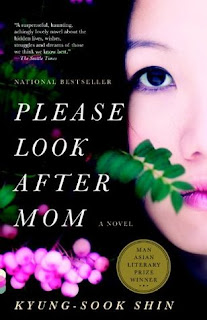Please Look After Mom
A glance at my blog will tell you I rarely read fiction published recently. "In my younger and more vulnerable years," I was unfortunate to read a lot of poorly written historical fiction and Sherlock Holmes pastiche. I thirsted for greatness and found mediocrity. Back then, I wasn't part of a blogging community, or maybe this wouldn't have happened. Anyways, I developed a prejudice against modern authors, which, based on my limited reading, was not well founded.
I stumbled across this book on Goodreads; not sure how, exactly. Like everyone else, I've been following the news on North Korea with uneasy interest, and at the same time, I've become increasingly fascinated with Korean culture, introduced to it by some of my favorite YouTubers, like Jen Chae. Please Look After Mom, by Kyung-sook Shin, sounded like a novel I could learn from.
The focus of the story is universal. When Chi-hon's elderly mother goes missing in a busy part of Seoul, the Park family reacts in different ways. True, they go through similar motions of looking for her - from putting up flyers to searching the city on foot - but inside, each family member begins to mourn "Mom" as someone deeply integrated in their lives and yet ultimately an enigma. "Mom" was strong, vulnerable, spiritual, superstitious, gentle, and violent. "Mom" was a strange juxtaposition of tradition and modernity. At all times, "Mom" was self-sufficient. Somehow she had been all of those things, and yet, if that had been real, how could she be missing?
The first half of the book was truly gripping, told from the perspectives of Chi-hon and her brother Hyong-chol. Shin's prose, translated by Chi-young Kim, moves deftly from present to past, as we discover more about Chi-hon's mother - whose first name is So-nyo - and the sometimes tumultuous relationships between her, her children, and her husband.
What impressed me here was the contrast between Chi-hon's life and her mom's. In just one generation, the woman of the family had gone from being an illiterate yet knowledgeable farmer - working hard to get food on the table for five children - to living as a published author whose ties with tradition and the farmland are less strong. I enjoyed learning about the Korean traditions which So-nyo held to so steadfastly, while the portrait of Chi-hon fulfilling her mom's dream was quite moving.
The second half of the book covers the perspectives of So-nyo's husband and So-nyo herself. Here I must admit I was having to suspend some disbelief. It was hard for me to follow that the father, self-centered his entire life, became suddenly remorseful; it just seemed a bit convenient. Meanwhile, there are things we learn about So-nyo which sound a bit incredible, considering her life and surroundings. Maybe I'm too critical. In any case, I felt these were small weaknesses in the plot, and overall they didn't detract from the core of the story.
One detail about So-nyo that stood out to me was her Catholicism. While intermingled with her traditional beliefs, So-nyo's Christian faith is a recurring emblem in her life, with allusions to charity and love, as well as sin and repentance. The symbolism of Madonna as an inspirational figure is brief, yet effective. The Christian themes are all very subtle in this book, and I was pleasantly surprised they were both realistic and well written.
Despite being a novel about women, social change, and Korean history, Shin's story isn't overwhelmed by a historical or pro-feminist narrative, and this is its strength. At times, it's a brutally raw story, heavy in tone and topic, but there is beauty in Please Look After Mom, and that is that we see the characters as individuals, rather than just types. And as in Ishiguro's A Pale View of Hills, history is here more of a backdrop than a centerpiece, but this approach lends a humanity to the novel that makes it a worthy read for people of many backgrounds. 4.5 stars.




Comments